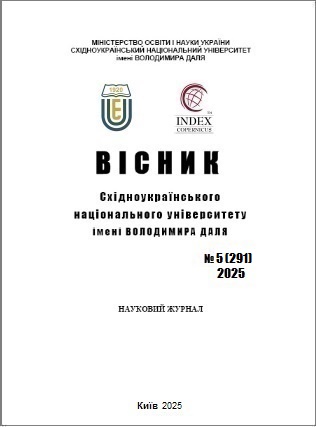Influence of the spread parameter of radial-base networks on the approximation of the main control channels of an acetic acid synthesis reactor
DOI:
https://doi.org/10.33216/1998-7927-2025-291-5-53-58Keywords:
radial basis neural network, reactor, approximation, influence parameterAbstract
The chemical industry is based on chemical reactors. In today's competitive scenario, it is paramount to support the various operating variables and meet product specifications. The continuous stirred tank reactor (CSTR) is widely used in many chemical, pharmaceutical and petroleum industries, as well as in environmental protection and waste management.Neural network models offer the most unified approach to building truly intelligent systems that can provide optimal control for many systems.
Over the past decade, artificial neural networks (ANNs) have gained importance as versatile data-driven structures for modelling nonlinear steady-state and dynamic processes.
To build and study the properties of the neural network, we used statistical data from an acetic acid synthesis reactor operating in a stationary mode. The MATLAB 2021b software simulator environment was used for modelling.
The aim of this work was to build and study the properties of radial basis neural networks RBF and GRNN, according to the main control channels of the acetic acid synthesis reactor, which is a gas-liquid reactor with continuous stirring. The investigated network can be proposed to be used for reactor control.
In this paper, we investigated the effect of the SPREAD parameter on the structure of the radial basis network and the quality of approximation. To model the radial basis networks RBF and GRNN for controlling an acetic acid synthesis reactor for each control channel, an iterative procedure for forming networks was used.
The relative error was used to quantify the quality of the approximation of the initial parameters. The SPREAD influence parameter for the radial basis function (RBF) network was determined to be 0.01, 0.1, 0.7, 2.0, 5.0, 10.0, 20.0, 50.0, 100.0. For the radial basis network GRNN, the values of the influence parameter SPREAD were taken to be 0.7, 2.5, 10, 20, 50, 100. The modelling of the radial basis networks RBF and GRNN for controlling the acetic acid synthesis reactor for each control channel using the iterative procedure for forming networks in MATLAB 2021b showed a satisfactory quality of approximation of the original data.
It can also be said that the radial basis networks RBF and GRNN can be used to improve the control of the acetic acid synthesis reactor by all the main control channels.
References
1. Kamesh R. Adaptive ANN Model based Nonlinear Control of a Semi-batch Polymerization Reactor Challenge Problem/ R. Kamesh, K. Y. Rani - 2016 Indian Control Conference (ICC), Indian Institute of Technology Hyderabad, January 4-6, 2016. Hyderabad, India, p.222-229, DOI: 10.1109/INDIANCC.2016.7441132
2. Pozna C. An approach to the design of nonlinear statespace control systems / C. Pozna, R. E., 2018, Precup Stud. Inform. Control, vol. 27, no. 1, pp. 5–14, doi.org/10.24846/v27i1y201801
3. Dirion, J.L. Elaboration of a Neural Network System for Semi-batch Reactor Temperature Control: an Experimental Study/ J.L.Dirion, B. Ettedgui, M.Cabassudm, M.V. Le Lann, & G. Casamatta, 1996, Chemical Engineering and Processing, Vol. 35, pp. 225-234. https://doi.org/10.1016/0255-2701(95)04120-6
4. Galván I.M. The use of neural networks for fitting complex kinetic data/ I.M. Galvána, J.M. Zaldívara, H. Hernández b, E. Molga , Computers & Chemical Engineering, Volume 20, Issue 12, 1996, Pages 1451-1465, https://doi.org/10.1016/0098-1354(95)00231-6
5. Gao D. X. Optimal dynamic control for CSTR nonlinear system based on feedback linearization/ D. X. Gao and H. Liu, in Proc. IEEE Conf. Chin. Control Decis. (CCDC), May 2015, pp. 1298–1302., DOI: 10.1109/CCDC.2015.7162119
6. Vasičkaninova A. Neural Network Predictive Control of a Chemical Reactor »/ A. Vasičkaninova, M. Bakošova, Acta Chimica Slovaca, Vol.2, No.2, 2009, 21 - 36 ДОИ: 10.1109/87.668039
7. Akpan, A. V. Nonlinear Model Identification and Adaptive Model Predictive Control Using Neural Networks/ A. V.Akpan, G. D.Hassapis, 2011, ISA Transactions Vol. 50, pp.177–194 дои: 10.1016/j.isatra.2010.12.007.
8. Dong-Juan L. Adaptive neural network control for continuous stirred tank reactor process/ L. Dong-Juan, 2013, IFAC Proc. Volumes, vol. 46, no. 20, pp. 171–175, Jan. doi.org/10.3182/20130902-3-CN-3020.00148
9. Nassira Z. Adaptive neural-network output feedback control design for uncertain CSTR system with input saturation/ Z. Nassira, C. Mohamed, N. Essounbouli, Oct. 2018, in Proc. Int. Conf. Elect. Sci. Tech. Maghreb (CISTEM), pp. 1–6., DOI: 10.1109/CISTEM.2018.8613330
10. Alshammari O. A Neural Network-Based Adaptive Backstepping Control Law With Covariance Resetting for Asymptotic Output Tracking of a CSTR Plant/ O. Alshammari, M. N. Mahyuddin and H. Jerbi, 2020, in IEEE Access, vol. 8, pp. 29755-29766, , doi: 10.1109/ACCESS.2020.2972621.
11. Krenker A. Introduction to the Artificial Neural Networks / Andrej Krenker, Janez Bešter and Andrej Kos, 2011, [Internet]. InTech; Available from: http://dx.doi.org/10.5772/644
12. Beyhan S. Stable modeling based control methods using a new RBF network / S. Beyhan, M. Alci, - 2010, ISA Trans., Oct;49(4):510-8. doi: 10.1016/j.isatra.2010.04.005. Epub 2010 May 14. PMID: 20471011.
13. Akpan V. A. Nonlinear model identification and adaptive model predictive control using neural networks/ Vincent A. Akpan, George D. Hassapis, - 2011, April, ISA Transactions, Volume 50, Issue 2, Pages 177-194
14. Samoilova Zh.G. Development of a mathematical model of technological processes in a reactor for the synthesis of otic acid / Zh.G. Samoilova // Eastern-European Journal of Enterprise Technologies, 5/2 (113 ), 2021, pp. 94-104, DOI: 10.15587/1729-4061.2021.242816

